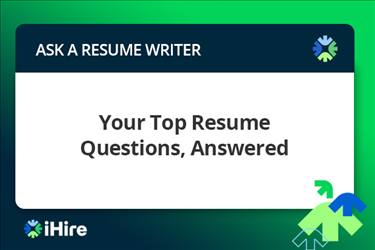- Job Seeker Resources
- |
- Last Updated: March 24, 2023

Tips for a Strong Recruiter Resume
Recruiters spend a large portion of their time reviewing resumes and assessing candidates, so you may think preparing their own resumes would be a piece of cake. However, that’s not always the case. If you’re looking for a recruiting job and struggling to write about yourself, read on for some specific tips and strategies on how to create a winning recruiter resume.
Generally speaking, recruiter resumes are no different than those for any other industry, field, or specialty. If you want to learn more about basic rules of resume writing, feel free to review iHire’s related articles and resume tips. For now, we can focus on what makes a strong resume for recruiting jobs.

Title, Summary & Key Skills
At the top of your resume, include a straightforward title such as Recruiter, Recruiting Professional, Recruiting Manager, or Director of Recruiting. If you wish, you can be even more precise and specify the industry or career level that best fits your background (e.g., Healthcare Recruiter, IT Recruiter, or Executive Recruiter). However, you may risk pigeonholing yourself by using a title that is too exact.
Your resume summary should be no longer than 3–5 sentences and include your experience level, areas of expertise, and notable skills that are relevant to the job listing. For example:
Versatile and results-driven hiring specialist with more than 10 years of experience devising and implementing winning recruitment strategies for the financial services, IT, and healthcare industries. Effective executive recruiter with expert ability to determine proper fit and maximize success of top-level candidates. History of driving down recruiting costs, accurately assessing staffing requirements, and devising hiring approaches that attract high-quality talent and align with organizational goals. Respected leader and valued contributor to C-level management teams.
Following your summary, list 10–15 industry-specific resume buzzwords (no more than 3 lines) to supplement those mentioned in your summary paragraph. This section is designed to aid the resume in getting past applicant tracking system (ATS) screenings. Plus, this section will make it easier for the recruiter to assess your core competencies. Here are some examples of HR and recruiter resume skills:
- Industry Research & Analysis
- Diversity Management
- Needs Assessment
- Contract Negotiation
- Vendor Relations
- Behavioral Interviewing
- Project Management
- Benchmarking
If you’re not sure which skills to put in your core competencies section, look for examples in the job listings found on iHireHR. Before you apply, pick out some skills that are listed in the job posting and add them to your resume if they apply to you. Including skills that appear in the job ad will increase your chances of being called in for an interview.
Below is a job listing for a Senior Talent Acquisition Specialist with a few potential buzzwords marked:
- Manage full life cycle recruiting process from specification through the employment offer.
- Lead a team of up to 4 direct reports comprised of recruiters & coordinator(s).
- Partner with HRBP team, hiring partners, and leaders to identify personnel needs & workforce planning as well as partner with FP&A to manage allocated budgets for headcount.
- Consult with hiring managers on recruiting process, strategy and expectations.
- Prepare candidates for interviewing with ABC Company and specific hiring managers by providing detailed information on the company, business strategy, job descriptions and expectations.
- Organize post-interview debrief/feedback with interview teams and candidates.
- Maintain records on department specific recruiting activities via detailed metrics and reporting.
- Develop an effective pipeline of key talent potentially available for immediate hire as succession planning needs dictate.
- Stay informed of trends and innovative recruiting techniques to attract and compete for top talent in the market.
- Ensure team is organized and efficient with daily practices including; ATS, reporting, OFCCP compliance, active and closed requisitions, new requisition guidelines, interview procedures and training, workflow processes and other team responsibilities as necessary.

Professional Experience
The structure of the professional experience section will differ depending upon your career history. In a traditional chronological resume, positions are presented in reverse-chronological order with a brief paragraph outlining day-to-day duties followed by bulleted achievements. This resume template works best for people with steady work histories and a career target that closely aligns with their current or most recent roles.
However, the traditional format isn’t always the best option. For example, if you have had multiple contract assignments, taken on temporary recruiting projects, or held several short-term roles over the past 10 years, you may consider using a functional resume template to avoid repeating the same job duties for each position.
The functional format allows you to highlight all of your notable career accomplishments in a prominent area of the resume (right below your summary paragraph and key skills). This section – titled Professional Highlights, Key Achievements, Selected Accomplishments, or Value Offered, among other options – enables you to showcase your unique experience while strategically organizing your “greatest hits.” Your career history will still be listed in reverse-chronological order, but only your job title, employer name and location, and start and end years are included
Register with iHire to find your next great opportunity.
Achievements
Your accomplishments will always be the most important part of your resume. However, many recruiters fall into the trap of thinking every HR professional who manages hiring and talent acquisition completes the same tasks and has the same basic achievements: filling open positions. That’s simply not true. There are a wide range of contributions that can be highlighted. For example:
- Increased response rate 500% by reinventing recruitment ads, utilizing templates from neighboring region, upgrading tracking system to maximize advertising dollars, and leveraging power of the ABC Company brand.
- Introduced social media as recruiting tool and expanded hiring via social from 7% in 2014 to 25% in 2015.
The achievements you include on your recruiter resume will separate you from the competition and help to convince the hiring manager that you are the best candidate for the position. By crafting your resume carefully, adding frequently searched recruiter resume skills, and following the other resume writing tips outlined above, you will increase your chances of being called in for an interview.
To view HR and recruiter resume samples created by our team, visit the iHireHR Resume Services page.

Originally Published: November 05, 2019
Sign In or Register to access all articles and insider tips for help in your job search.
Search for Human Resources Jobs
RELATED JOBS
Are you looking for more? At Mohawk Industries, were committed to more more customer solutions,...
Safety ManagerPOSITION SUMMARY The site Safety Manager assists the Division Safety Manager and leadership in...
Human Resources Business Partner ILocation: This position is located at our Dublin, OH campus with hybrid flexibility. Who we are...
Lead Recruiter & HR AssistantFull-time Lead Recruiter and HR Assistant to drive our talent acquisition and support our HR...
Safety CoordinatorJoin our team and shape the future of connectivity: Safety Coordinator at E2 Optics! CLICK HERE...
RELATED RESOURCES
Find the Right Job Faster
- Get personalized job matches sent to your inbox every day
- Connect directly with employers before your competition
- Advance your career with expert advice on interviewing, salary negotiation, and more
We value your privacy




